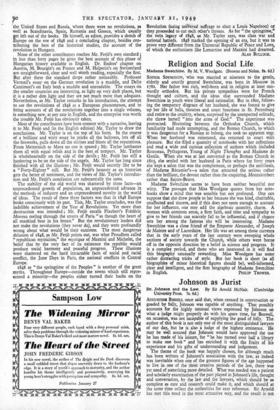Religion and Social Life Madame Swetchine. By M. V. Woodgate.
(Browne and Nolan. 8s. 6d.)
SOPHIA SOYMONOV, who was married at nineteen to the gentle, elderly and courtly general Swetchine, was born in Moscow in 1782. Her father was rich, well-born and in religion at least out- wardly orthodox. But his private sympathies were for French thought and culture, and the ideas that surrounded Madame Swetchine in youth were liberal and rationalist. But in itior, follow- ing the temporary disgrace of her husband, she was forced to give up her life of balls, theatres and court functions in St. Petersburg and retire to the country, where, surprised by the unexpected solitude, she threw herself " into the arms of God." The experience was protracted. Hesitating between the Orthodox Church, which familiarity had made untempting, and the Roman Church, to which it was dangerous for a Russian to belong, she took no apparent step. When her husband was reinstated, she returned to court with pleasure. But she filled a quantity of notebooks with her reflections and read a wide and curious collection of authors which included Rousseau, Pythagoras, Young of Night Thoughts and Madame de Geniis. 'When she was at last converted to the Roman Church in 1815, she settled with her husband in Paris where for forty years she kept a salon that was the complement, or perhaps the antithesis, of Madame Recamier's—a salon that attracted the serious rather than the brilliant,,the devout rather than the enquiring, Montalembert rather than Sainte-Beuve.
Madame Svietchine seems to have been neither beautiful nor witty. The passages that Miss Woodgate quotes from her note- books show a mind that was sensible but not profound. One can suppose that she drew people to her because she was kind, charitable, unaffected and sincere, and if this does not seem enough to account for her influence, one may add the algebraic quantity, charm. A woman with common sense, a firm faith, and time and sympathy to give to her friends can scarcely fail to be influential, and if chance sets her among the famous she will be interesting. Madame Swetchine was a close friend of the Emperor Alexander, of Joseph de Maistre and of Lacordaire. Her life was set among those currents that in the early years of the last century were sweeping whole sections of society towards the Church, while others were borne off in the opposite direction by a belief in science and progress. It is a complex period, and those who are interested in it will find this biography unusually rewarding. Miss Woodgate has some rather distracting tricks of style. But her book is short (as all biographies of minor historical figures should be), well-informed, clear and intelligent, and the first biography of Madame Swetchine






































 Previous page
Previous page